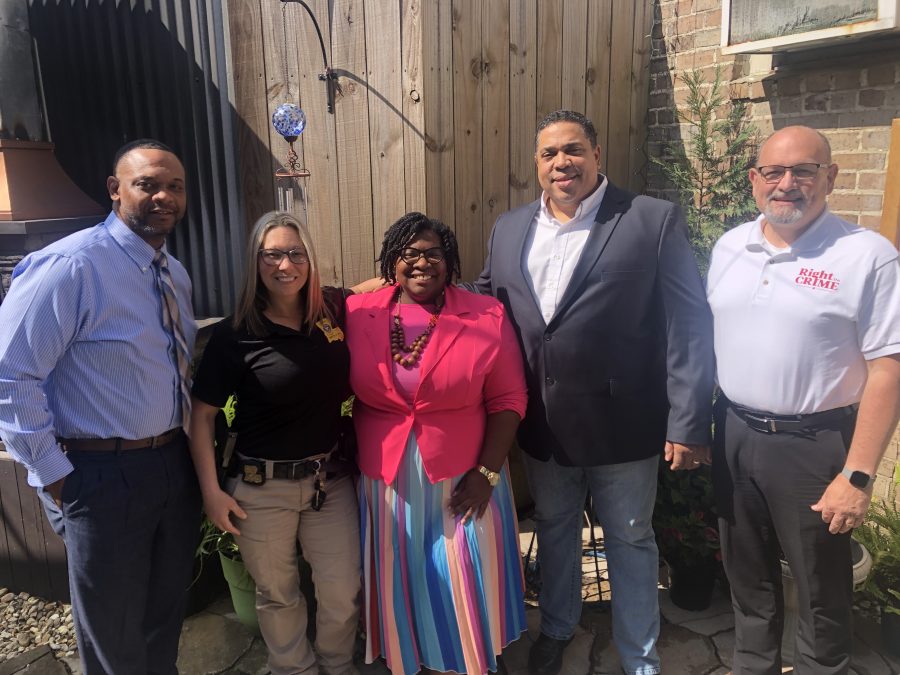
Time to indulge in National Donut Day!
June 3, 2022
Billie Robertson
June 3, 2022Over 90 percent of Terrebonne and Lafourche Parish inmates will get re-released back into communities. Some local leaders make up a Bayou Region Re-Entry Team that is taking strides to provide the incarcerated with resources to return as productive citizens and a Bayou Region Coalition Meeting was recently held where the team updated the public on programs along with their success stories.
The Bayou Region Re-Entry team, partnered with Goodwill Industries, aims to end the stigma of the incarcerated. Major Cortrell Davis, Correctional Department Head for Lafourche Parish Correctional Complex and Warden for the Correctional Complex, has been in corrections for 25 years and said he is in awe at the process the re-entry team has had so far. He shared in the meeting they have been awarded the opportunity to serve as the regional re-entry facility of the Southeastern portion of Louisiana. The team works together to offer resources to those behind bars. The team’s goals are to return individuals to the community as productive citizens and to assist them in releasing the barriers that Major Davis said are aimed to return inmates to incarceration. Some of the barriers are lack of education, lack of diagnosis of mental health issues, substance abuse, and lack of skill or trade. “We are diving into all those areas and trying to serve the inmate population,” he said.
Major Davis said in the last 20 years of his career, they have always warehoused individuals and thought it was the solution, but he said that is outdated, and they are working to limit the mindset, “In doing so, we have to dive into the why’s and assess individuals.” That is what Major Davis helps facilitate; finding the why’s and assessing the incarcerated needs to end the cycle of incarceration. Some inmates, Major Davis said, just need behavior modification and told the difference between right and wrong. Substance abuse also takes a role in the reasons why people continue to get into the system, and the team has been awarded a contract with the Department of Corrections to have a substance abuse treatment program within the facility. He shared they have many educational opportunities for those who need resources to further their education. They work with Nicholls State University through courses such as the Inside Out Program, which allows outside students (Nicholls students) to partner with the inside student (incarcerated individuals), which helps break down barriers. Through partnerships with Fletcher Technical Community College and Ashland University as well. Through Ashland University, he shared they have an inmate graduating with a bachelor’s degree, which he said was unheard of in the past but is the direction they are continuing to move in. Fletcher offers inmates industry-based training such as forklifts, welding, and auto. “We are continuously trying to cater to the need of the workforce and we are continuously trying to monologize a lot of the talent that is in some of these walls,” Major Davis said. The Lafourche Parish Correction workforce training programs, just so far, have had 33 forklift certifications, 9 automotive certifications, 16 welding certifications, and 20 NCCER cores.
Officer Hester Serrano, Re-Entry Program Manager for Louisiana Probation and Parole, helps with the transition with supervision, “people continue these programs that they have already been doing in the jails, Terrebonne and Lafourche both, and to also make sure that we are addressing those barriers that may pop up as they are being released,” she explained. She explained that some individuals that are released don’t have anything; no family support, no clothing, no necessities, I.D.s, and the list goes on. She reported last year, through the Thibodaux district, they were able to assist 73 individuals to get on their feet with basic needs. Another issue is homelessness. The Department of Corrections offers an emergency and transitional housing program that she said is utilized in the area often. The program allows someone into transitional housing for up to six months or when their supervision ends, whichever comes first. “It will pay for that housing piece giving them enough time to get up on their feet and start saving money to be able to be self-sufficient,” she explained. They have had 55 individuals go through the area since its inception and have been a successful resource.
The Lafourche Reporting Center has a contract, as of January, with the Lafourche Parish Sheriff’s Office. Since the contract, they have had 120 referrals from the Thibodaux District Office into the program. In May, there were 53 people enrolled in the Re-Entry Program. Of those 53, 18 are employed, 11 were able to gain employment after starting the program, seven went into the program with employment, and six people enrolled in the HISET program. Serrano then went into different aspects of the program which includes therapies, and substance abuse classes that include a holistic intensive outpatient program aside from educational courses. The program also includes programs for anger management, domestic abuse, life skills, employment, parenting, yoga, meditation, and getting individuals involved with the community to help serve those in need. Upcoming services will look into peer support mentorships, and Beacon Light is looking to do faith-based groups. “The sky is the limit,” she said,” because if you can touch every aspect of someone’s life, then you can truly change it.”
On the Family and Child Welfare Committee, Megan Warren, LPC-S Chief Compliance and Utilization Management Officer, explained next that they incorporate the child and family aspect of re-entry. The focus is on the way incarceration, and re-entry, affect children and family members. They assist families establish, repair, and maintain relationships, along with preparing families for their loved one’s return. Warren then shared a visual, developed by Dr. Casey Lottinger, DPC, LFC-S, NCC, of how incarceration affects children developmentally. For example, in the first two months of a baby’s life, having an incarcerated parent could affect bond development and cause antisocial behavior. During the toddler stage, age one to three, short-term effects could be fear and shock and could have long-term effects such as aggression, attention problems, and internalizing behavior. Warren explained that early intervention is possible and is part of the subcommittee’s goals that they are working toward along with other agencies. “We need to address within the families in that connection in healing the whole system instead of just focusing on the incarcerated persons, “she explained,” because of not having the support system..you will see the repeat of generational cycles and barriers.” She said our area has many resources in behavioral health, mental health, and education, that they just have to utilize to help the families in need.
Another aspect of the program is health care. Next to speak was Bayou Region Health Care sub-committee chair Stacy Henry, Operational Manager at Ochsner Health Systems at Chabert, who said health care is essential for the incarcerated because they have a high risk for adverse health outcomes and death due to preexisting behavioral health along with chronic and infectious medical conditions. These problems are barriers to health care and basic social determinants of health such as housing, food, transportation, and employment. Henry said even with Medicaid, access to care is challenging for the re-entry population. Internalized racism, posttraumatic stress disorder, and the stigma associated with incarceration, mental illness, and substance use disorders, negatively affect requests for needed services. With this explained, she went on to describe some programs that are offered such as Medicaid enrollment, Operation Sunrise/TCU Food Bank Vouchers which help with food insecurity, and the latest Second Chance Sight Drive that collected 250 pairs of glasses, 60 of which were dispensed through parish correctional facilities. They aim to navigate individuals into the primary care upon release, “What we do know is when inmates are coming out, health care is not what’s a priority. What we find in the health care system is that when we do get the patients into the system, by this time they have decompensated. We want them to be healthy from the start,” she said. They have a partnership between Ochsner/Chabert and START Corporation for primary care services and look forward to access to 340B pharmacy which is outside any insurer so they can provide low-cost prescription medication.
Scottie LeBlanc, Vice-President of Goodwill Mission Services, explained the workforce program. LeBlanc noted that the program takes all of the partnerships involved and the success cannot be done without those relationships. He highlighted a few programs that are available for workforce assistance. Through Goodwill, he mentioned they have multiple funding sources including a community incentive grant through the Department of Corrections, a U.S. Department of Labor Pathway Home Grant, and Goodwill funded programming. Each program has different eligibility criteria, “What we try to do is fit somebody into one of the grant programs, and if we’re unable to, that’s where the Goodwill funded programs come in so we can build capacity and offer as much as possible,” LeBlanc explained. They serve the currently incarcerated, anyone with a history of incarceration, those who are participating in a pre-trial intervention program, participating in drug courts, and are trying to help any who has touched the justice system. They offer career navigation under the framework of case management which includes re-integration support, goal setting, developing individualized career plans that will provide employment assistance through job readiness training, resume creation, employment search, providing job leads, education and training assistance, financial assistance through approved training through the Department of Labor grant, a partnership with Fletcher and Lafourche Parish Sheriff’s Office so that they can provide training, legal assistance, mentoring programs, support of wraparound services, transportation assistance, and the list goes on. “It takes a village and everyone working together,” he said.
Elizabeth Daigle, South Central Louisiana Human Service Authority (SCLHSA) Program Manager, presented on behalf of the behavioral health aspect of re-entry. Their goal is to provide behavioral health services to individuals who are incinerated and recently released. Daigle said the subcommittee has identified that there is a huge need for behavioral health services while they are incarcerated and when they are released. They identified barriers including lack of resources, transportation to appointments to maintain recovery, compliance with the first appointment upon release, housing, and the stigma when it comes to incarceration. To tackle the barriers, there is a partnership with Lafourche Parish Sheriff’s Office and SCLHSA. The program provides a case manager or peers support specialist from SCLHSA to go into the jail to meet with the individual to determine the level of care needed and their discharge needs. They then start a discharge plan while they are incarcerated. Other networking that has occurred is drug court and LRS which work to get individuals into college courses. The LPSO and drug court work in coordination to re-establish recovery support meetings back in the jail since Hurricane Ida. She has also shared a Methadone Clinic will be opened in Houma this year so they can coordinate services as they go through the re-entry transition.
The strides of the Bayou Region Re-Entry Team have made a difference in numerous lives and it’s just the beginning. For more information or to find out how to offer resources, contact Goodwill Community Coordinator Sherry Wilmore at swilmore@goodwillno.org.







